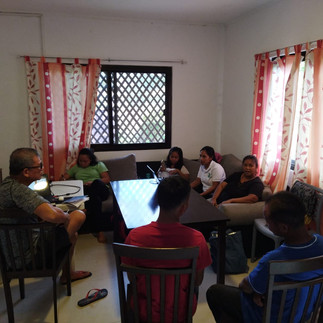Capacitation of a local team to conduct community-based research and documentation
- Jan 4, 2022
- 2 min read

One of the main objectives of the Mangyan-Tamaraw Driven Landscape Program of DAF is to support the Taobuid tribe in formulating a “Community Conservation Plan” for the section of their Ancestral Domain that shares boundaries with Mts Iglit-Baco Natural Park (MIBNP). This plan and the MIBNP Protected Area Management Plan need to be aligned with each other with regards to the management and conservation of natural resources and cultural preservation.
To achieve the above objective, it is essential to better understand the lifeways of the concerned Taobuid communities, their traditional practices so as to build common ground between the Taobuid’s customary rights and state policies. This process requires patient field work and specific expertise to collect data and conduct relevant documentation.
The Taobuid are secretive and distrustful of outsiders, making it challenging to conduct documentation. In addition, the situation created by the pandemic has reshuffled the ways to involve specialists on site. Therefore, our response has been to build and train a local team composed of DAF people and PAMO staff including Taobuids themselves.
A customized online program has been designed in collaboration with specialists on local communities and indigenous concerns from the University of the Philippines Baguio, led by Professor Leah Abayao (College of Social Sciences). After three modules we are glad to measure the progress of our local team and the interest created both from them and from our partners. The themes covered in the modules revolve around how to conceptualize an IP-focused and sensitive research design by formulating objectives and research questions, data collection methods, analysis, actual writing and the different uses of the final product. The training approach employed is interactive and hands-on; after the first introduction module, the participants were asked to choose a topic and conduct research and documentation using the knowledge and skills they learned from the training. Their drafts were then commented on by the trainers and revised by the participants. Topics chosen included the history and importance of rice among the Taobuids, the different fishing methods used by the communities, activities related to the planting of rice among the Taobuids, what the Taobuids in highly assimilated settlements still consider as sacred, the evolution of the alternative educational system in highly assimilated settlements, and initial assessment of production and consumption of rice and other food sources in more remote settlements. The aims is to enable the team to conduct more thorough documentation of upland communities sharing their living space with the tamaraw. More modules will be conducted.
Through this approach, we aim to support the Protected Area Management Office to achieve some of their targets under the guidance of the Expanded National Integrated Protected Areas System (ENIPAS) Act of 2018 that recognizes ancestral domain of indigenous peoples sharing boundaries with protected areas.
















Comments